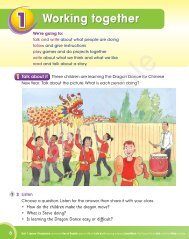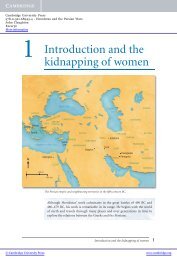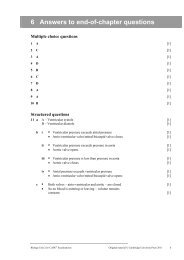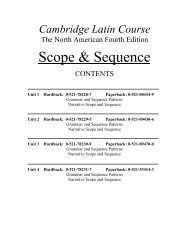Brad Philpot - Cambridge University Press
Brad Philpot - Cambridge University Press
Brad Philpot - Cambridge University Press
You also want an ePaper? Increase the reach of your titles
YUMPU automatically turns print PDFs into web optimized ePapers that Google loves.
The text has the purpose of warning its readers about certain trends in politics or<br />
society at the time it was written.<br />
As you read the following extracts, Text 6.1, look for the four characteristics of<br />
dystopian literature in the list. Text 6.1 is 3 extracts from the novel Fahrenheit 451 by Ray<br />
<strong>Brad</strong>bury, an author who is often associated with the genre of dystopian fiction.<br />
Text 6.1 Fahrenheit 451, Ray <strong>Brad</strong>bury, 1953<br />
This novel takes place in America at a time in the future. The main character, Guy Montag,<br />
is a ‘fireman’, which in this novel means a person who burns books. Fahrenheit 451 refers<br />
to the temperature at which paper and therefore books spontaneously combust. After<br />
Montag meets his neighbour, a young intellectual, he begins to question why the state<br />
employs him to burn books. He begins to secretly collect books and eventually stays away<br />
from work to read them. At this point, he is visited by the chief of the fire department,<br />
Captain Beatty, who is speaking in the extract below, sitting at Montag’s bedside.<br />
Extract 1<br />
‘When did it all start, you ask, this job of ours, how did it come about, where,<br />
when? Well, I’d say it really got started around about a thing called the Civil War.<br />
Even though our rule-book claims it was founded earlier. The fact is we didn’t get<br />
along well until photography came into its own. Then – motion pictures in the early<br />
twentieth century. Radio. Television. Things began to have mass.’<br />
Montag sat in bed, not moving.<br />
‘And because they had mass, they became simpler,’ said Beatty. ‘Once,<br />
books appealed to a few people, here, there, everywhere. They could afford to<br />
be different. The world was roomy. But then the world got full of eyes and elbows<br />
and mouths. Double, triple, quadruple population. Films and radios, magazines,<br />
books levelled down to a sort of paste pudding norm, do you follow me?’<br />
‘I think so.<br />
Extract 2<br />
Yes, but what about firemen, then?’ asked Montag.<br />
‘Ah.’ Beatty leaned forward in the faint mist of smoke from his pipe. ‘What<br />
more easily explained and natural? With school turning out more runners, jumpers,<br />
racers, thinkers, grabbers, snatchers, fliers, and swimmers instead of examiners,<br />
critics, knowers, and imaginative creators, the word “intellectual”, of course,<br />
became the swear word it deserved to be. You always dread the unfamiliar. Surely<br />
you remember the boy in your own school class who was exceptionally “bright”, did<br />
most of the reciting and answering while the others sat like so many leaden idols,<br />
hating him. And wasn’t it this bright boy you selected for beatings and tortures after<br />
hours? Of course it was. We must all be alike. Not everyone born free and equal,<br />
as the Constitution says, but everyone made equal. Each man the image of every<br />
other; then all are happy, for there are no mountains to make them cower, to judge<br />
themselves against. So! A book is a loaded gun in the house next door. Burn it.<br />
Extract 3<br />
‘You must understand that our civilization is so vast that we can’t have our minorities<br />
upset and stirred. Ask yourself, what do we want in this country, above all? People<br />
want to be happy, isn’t that right? Haven’t you heard it all your life? I want to be<br />
happy, people say. Well, aren’t they? … That’s all we live for, isn’t it? For pleasure,<br />
for titillation? And you must admit our culture provides plenty of these.’<br />
Chapter 6 The context of composition<br />
1 What examples are there in<br />
Text 6.1 of the characteristics of<br />
dystopian literature?<br />
2 How convincing do you fi nd<br />
Beatty’s case for censorship?<br />
Explain your answer with<br />
examples from the text.<br />
3 How might the ideas of this<br />
novel refl ect the zeitgeist of the<br />
1950s?<br />
Sample<br />
© <strong>Cambridge</strong> <strong>University</strong> <strong>Press</strong> 2011<br />
tip<br />
discussion<br />
Several works of dystopian literature<br />
offer interesting insight into the<br />
topic of media that you explored<br />
in Part 2: Language and mass<br />
communication. You may want to<br />
explore more texts from this genre<br />
that relate to the media. Try, for<br />
example, Nineteen Eighty-Four by<br />
George Orwell, Vernon God Little by<br />
D.B.C. Pierre, or the screenplay The<br />
Truman Show by Andrew M. Niccol.<br />
139








